Note
I'd be curious to hear your Ob-la-di Ob-la-da take lol
I claimed Ob-la-di Ob-la-da as a political song. No, I'm not kidding.
Obviously, Ob-la-di Ob-la-da isn't a protest song. It's a perky ska-style number about the happy, everyday life of an immigrant family. And it was released in 1968, when immigration had just become the most inflammatory topic in British politics.
In spring 1968, the UK government proposed a new Race Relations bill, making it illegal to refuse housing, employment, or public services to anyone on the grounds of race or national origin. It was a response to racism, particularly against recent immigrants, especially those from the Caribbean.
Cue a lot more racism, most notoriously from politician Enoch Powell, who gave what is still commonly referred to today as the "Rivers of blood" speech. Powell ranted about sending "the immigrant and immigrant-descended population" back to the countries they or their families had once come from. He was particularly freaked out by the idea that, having come to Britain, people would settle down and - horrors - have babies, eventually outnumbering the white population. Powell was sacked by his party the next day, but he sparked a horrible wave of racist protest and abuse.
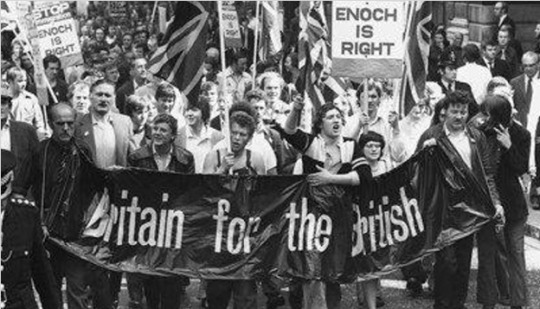
All this was brewing over the summer, as The Beatles worked on the White Album, and on this song. What is Ob-la-di Ob-la-da about? It's an everyday love story. The ska style frames Desmond and Molly as Jamaican - which, in a British context, strongly suggests that they're immigrants. The song builds a happy ending out of exactly the things that racists like Powell were terrified that immigrants would do. They work, get married, and have children, who grow up and help with the family business. Life going on, happy ever after.
The Beatles were certainly aware of the tensions sparked by Powell, immigration and the Race Relations Act; they were still talking about it, and trying to write a protest song about it, in the Get Back sessions in January 1969. Ob-la-di Ob-la-da doesn't talk directly about any of that. Its subjects - work, home, children - are the sort of thing that 1970s rock journalists would put down as Paul's normie bourgeois sensibilities.
But normie is where most people live. The song presents Desmond and Molly as deeply relatable. It assumes that their happy ending is something everyone can root for and sing along with. That is not an apolitical act, particularly not in Britain in 1968.
youtube
And people did sing along, in their millions. Ob-la-di was staggeringly popular. The Beatles didn't release it as a single in the UK or the US (though it topped charts in Australia, Japan and Europe). There were multiple competing cover versions. One by the band Marmalade went to No 1 in Britain, and sold about a million copies. Paul's own favourite cover was by The Bedrocks, whose members were all first-generation immigrants from the Caribbean.
(Obviously, there are other questions here about race, music, and appropriation; The Beatles, and most of the artists doing cover versions, are white people singing black music. Hello, history of western popular music.)
As I said, this isn't a protest song. But it has been sung in protest. @beatleshistoryblog found this great footage from a Women's March in London in 1971. Just listen to the first seconds: la la la la life goes on.
youtube
#ob-la-di ob-la-da#I've been thinking this for a while too!#art doesn't have to be overt or aggressive to make a statement
82 notes
·
View notes
Text
Reading the manuscript of Paul’s 1970 sworn affidavit to dissolve the Beatles partnership, which contains John’s comments and responses to Paul's statements handwritten into the margins, and beyond confused as to how John read this in the dissolution papers:
In September 1969 I was still keen that the Beatles should continue as a group. I therefore proposed that we should get the group together again, and play live before small audiences. Ringo agreed with this proposal and George was non-committal. Later at a meeting John said: "I think you're daft. Look, I might as well tell you, I’m leaving the group. I wasn't going to tell you till after the Capitol deal. When I told Allen (Klein) last night he said I was not to. I've had enough. I want a divorce, like my divorce from Cynthia (formerly his wife). It's given me a great feeling of freedom."
And yet was shocked when McCabe and Schonfeld told him the exact same thing in 1971:
M&S: I asked Lee Eastman for his view of the split, and what it was that prompted Paul to file suit to dissolve the Beatles' partnership, and he said it was because John asked for a divorce.
JOHN: Because I asked for a divorce? That's a childish reason for going into court, isn't it?
(See also.)
#it does make you wonder what john thought he was saying by asking for a divorce#and if he just expected paul to forget about it once his mood changed
75 notes
·
View notes
Text
hope you all remembered to leave edibles and a margarita for sir paul mccartney last night!
82 notes
·
View notes
Text
*THIS POLL IS NOT ABOUT HOW MUCH YOU'VE ALREADY LISTENED TO, BUT ABOUT YOUR GENERAL ATTITUDE AND INTENTIONS
**side-projects include experimental albums, collaborations, albums that fall outside the pop-rock umbrella (e.g. Liverpool Oratorio), etc.
*** this could even mean someone has criticized a song/album in a way that made you curious. It also includes you seeing a theory or interpretation of this song that got you interested.
68 notes
·
View notes
Text
“After the first LP in 1963, the following albums had been wonderful. But the Rubber Soul album was the most difficult one for me. It was much less enjoyable. I can’t remember how long the gap was between Help! and Rubber Soul, but there certainly had been one hell of a change in the relationship between the boys - mainly between John and Paul. It was very noticeable, and it made me quite sad in actual fact. Something had happened between those two albums, but I’m not sure what it was. That was the beginning of the end, really. That’s when it started.”
— Norman Smith, The Beatles’ first engineer
#if I could be a fly on the wall for any album I think I'd pick Rubber Soul#a lot going on beneath the surface there
244 notes
·
View notes
Text
“But you know John and Yoko, you can see it now, the way to get their friendship is to do everything the way they require it. To do anything else is how to not get their friendship. This is still how it is with John and Yoko. I know that if I absolutely lie down on the ground and just do everything like they say and laugh at all their jokes and don’t expect my jokes to ever get laughed at, and don’t expect any of my opinions ever to carry any weight whatsoever, if I’m willing to do all that, then we can be friends. But if I have an opinion that differs from theirs, then I’m a sort of an enemy.”
Paul McCartney, speaking in 1980. All You Need Is Love, Peter Brown and Steven Gaines (2024)
#I'm always going back and forth on john and yoko#and of course they had specific business issues with paul#but also...#how many friendships did yoko ever have with people who weren't servants or sycophants?#it does feel like a bit of a pattern
146 notes
·
View notes
Text

this picture is so funny i truly believe he can reach through the veil
113 notes
·
View notes
Text
Alexis "Magic Alex" Mardas, who gave us nearly seven hours of his never-before-told experience with the Beatles and Maharishi - I've always been excited about these seven hours, so Magic Alex interview is next and I hope there will be a bit more to it than there was to Cyn's.
Stories I'm looking out for are definitely the violent Greek withdrawal, that gets repeated in other books frequently.
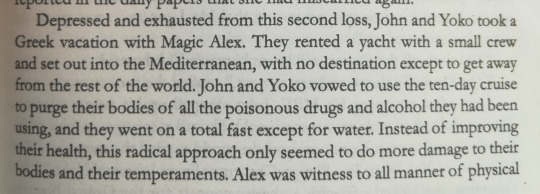

And all the other drug stories too, I guess.
If maybe he is the one who came up with the mid-flight-confession story that wasn’t in Cynthia’s interview.
His account of what happened in India and with Maharishi.
Just his take on the relationships with other people than John. Because everybody speaks so badly of him but looking at it from the outside he did seem to be well integrated.
#I'd forgotten this was in brown's first book#does seem like the kind of explosive claim that you'd want to document#a lot of the interviews in the new book seem truncated#but magic alex's particularly so
10 notes
·
View notes
Text
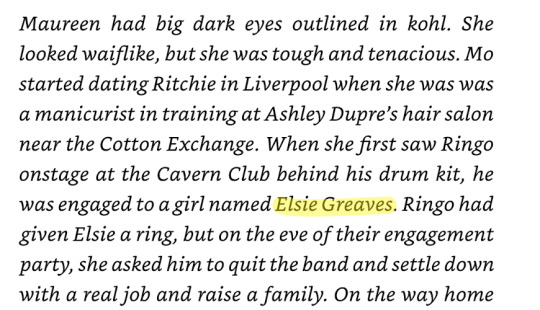
All You Need Is Love, by Peter Brown and Steven Gaines, casually claiming that Ringo was engaged to his own mother. It's totally valid to fact-check Mark Lewisohn, but it's also good to be reminded that this is the level at which a lot of Beatles books are written.
#books: all you need is love#this isn't exactly a great book#but the interviews themselves are still usually interesting#often in spite of the interviewers
19 notes
·
View notes
Note
one thing i've thought about paul before that definitely comes across in the new peter brown book is how much the business stuff drove him *crazy*, in large part because he often thought john (and the others, but especially john) were being unreasonable and/or paranoid about everything. and i definitely don't believe paul was like the sole bastion of reason in that mess or that his version of events is the unvarnished truth (they were all drugged up paranoid assholes behaving as such and all of their accounts are biased and self-serving). but i do think it must have been a nightmare to try to engage with john on any of this business stuff, right up until his death. and unfortunately, the business stuff dragged on and on and on, right up until his death and beyond. i really think people underestimate just how much of a driving factor it was both in john and paul's relationship ending and in it never really recovering.
Agreed. In the interview, Paul talks about John and Yoko being very suspicious people, and he's not the only one who described them that way - I think it was May Pang who said that Yoko was always feeding John's paranoia and encouraging him to distrust the other Beatles. It's hard enough to do business with your friends without them being chronically paranoid that you're trying to screw them over, especially since it ran right smack into Paul's issues too: in other areas of his life, he could just humor John or do what John wanted, but he was anxious about money and scared of losing what he had, which meant that he really couldn't just stop fighting and give in. Fighting John made his life hell, but not fighting John would have meant risking everything he'd worked for and his sense of security and peace of mind. And being proved right didn't even help, since that just annoyed John more. He couldn't win, and that's an awful situation to be in.
7 notes
·
View notes
Note
Well, Peter Brown’s interview transcripts clear up the mystery of when John and Paul last met in any case, which was obviously not in the months (or even years) leading up to John’s death. The Newsweek article was published in September or October, so Paul’s interview was after that and he hadn’t spoken to John since Christmas. Which means that John didn’t even call him when he got back from Japan. What a very sad man all that hate and anger turned him into.
Yeah, the quote from Paul is:
"I’ve hardly talked to him since. I rang last Christmas, and I was smart enough not to mention Apple. We had a pleasant conversation. I was allowed to talk to his son, which was lovely. His son seemed very nice. And that was now the new formula for life, for the Beatles—to this day, I’ve not mentioned that word to them. If I talk to Ringo, we just don’t talk about it."
Now, it's always tricky with these guys, because they have no real sense of linear time. It's possible that Paul was describing a fight they had any time between 1970 and 1979, and "I've hardly talked to him since" is hyperbole a la John's quote about not having spoken to Paul in 10 years. But overall, I would agree that he's describing their relationship as fairly distant and strained, and given how generally honest he seems in the interview, I'm inclined to believe that. He was obviously frustrated that John didn't trust him, and he went back a couple of times to the point about John and Yoko being suspicious and paranoid. And that is a shame: John had great friends and people who really loved him, and it feels like he lost out on a lot over the years because he couldn't trust in that.
2 notes
·
View notes
Text
I still don’t want to screw [John]. I still do feel for the guy. I really like the guy, even though what I’ve gone through. I still see that he thinks he’s the one who was hurt. I spoke to the Eastmans. I said, “If we all think he’s not going to have a tax consequence, let’s give [the indemnity] to him.”’Cause, you know, if all sides are that smart, let’s all offer it. Break the deadlock.
I went to New York, feeling like the bringer of good news. I rang him up. “Hello, John, how are you? Hello, how’s the kids? Oh, great. What’s all this about publishing? Yeah, great”—laugh laugh laugh—“What about Apple?” Tense. You know, that was the unfortunate thing in the last ten years. The moment you mention the word Apple, all of us go, eeeeep! Dread and horror and shock goes through all our systems. I said, “Look, as I understand it, you need this indemnity.”
John said, “Fucking indemnity. Fucking this, fucking that. You don’t need to give me fucking indemnity, you fucking—” I think we ended up just sort of swearing at each other. I said, “Fuck you, ya big cunt,”’cause I just couldn’t handle it. I couldn’t be sweet and reasonable anymore. I was shaking for an hour after that.
-All You Need Is Love, interview with Paul from 1980
#books: all you need is love#this is nothing we didn't know#but still#the image of paul trying to do what john wants and still getting screamed at#and ending up shaking for an hour afterwards
89 notes
·
View notes
Text
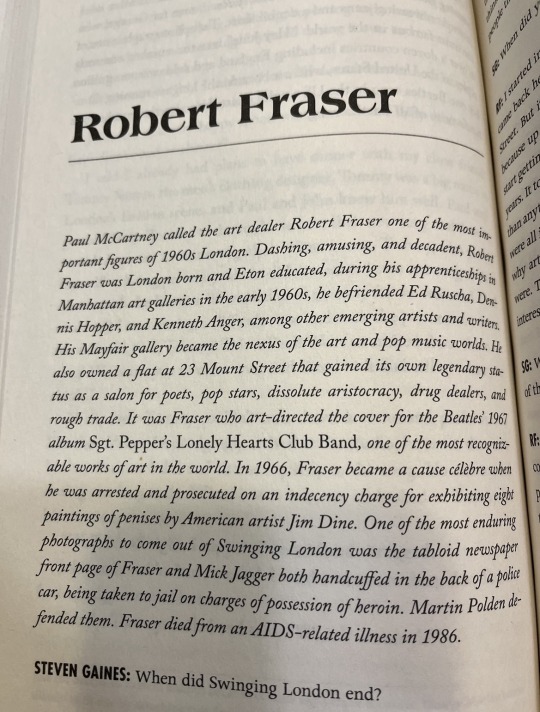


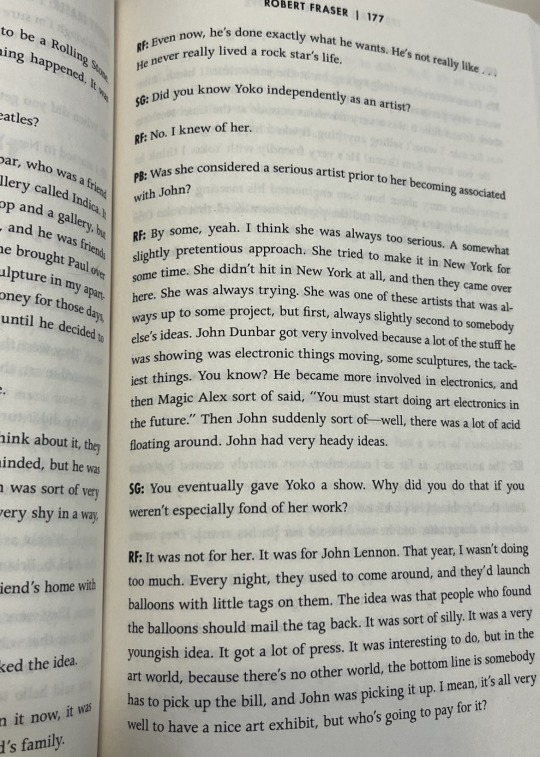
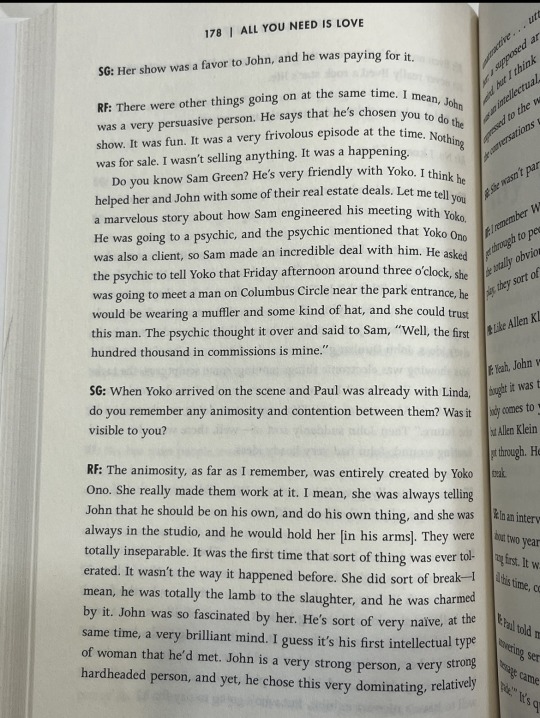


Robert Fraser’s interview with Peter Brown and Steven Gaines, All You Need is Love
Some highlights:
Robert Fraser: Peter Asher was Jane’s brother. I think he brought Paul over to my place. He made me sorry because he saw a sculpture in my apartment and said, “I want that.” It was quite a lot of money for those days, it was like 2,500 quid. Paul never asked the price until he decided to buy something. If he liked it, he wanted it.
Steven Gaines: I guess they didn’t have to think about the price
Robert Fraser: No, but most people, even if they don’t have to think about it, they want to know the price. Paul was very, very open-minded, but he was also more…Well, John was too, but I mean John was sort of very difficult to…He was more difficult to…He was very shy in a way, and it comes out in an aggressive way.
Steven Gaines: It’s an odd decision Paul made to live at his girlfriend’s home with her parents.
Robert Fraser: Paul was a very domestic sort of personality. He liked the idea.
Peter Brown: I didn’t think twice about it, but looking back on it now, it was pretty ahead of its time to move in with your girlfriend’s family.
Robert Fraser: Even now, he’s done exactly what he wants. He’s not really like…He never really lived a rock star’s life.
65 notes
·
View notes
Text
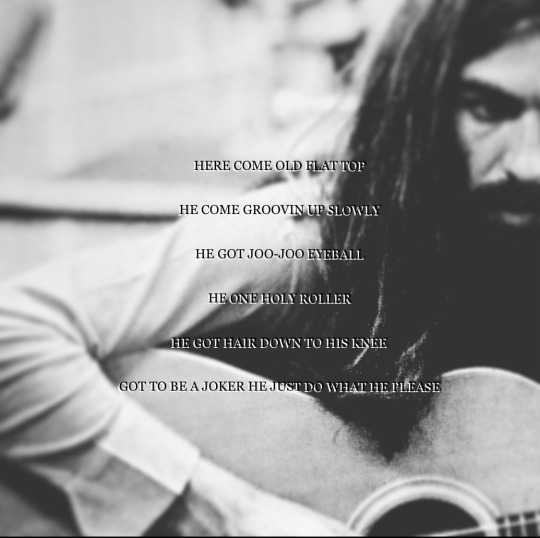
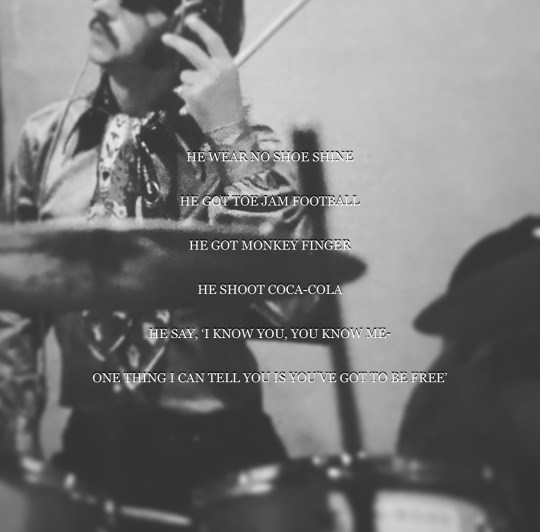
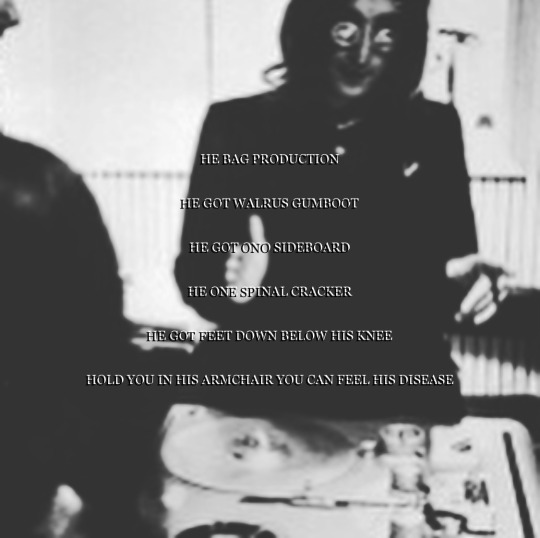
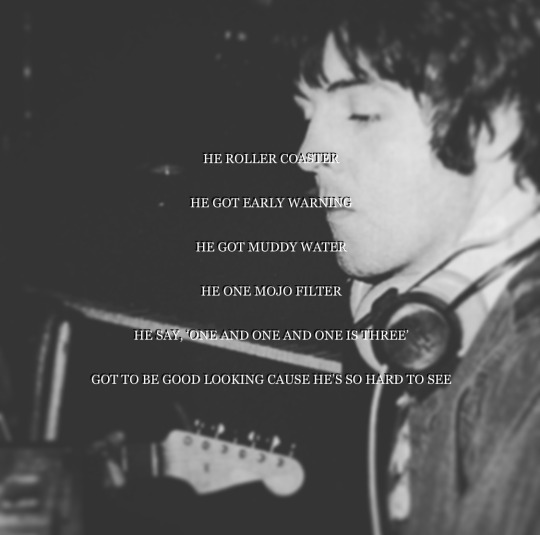
come together, right now, over me
#I go back and forth on the first two#but I don't see that as proof that the song is meaningless#just that it's an in-joke we aren't meant to understand
253 notes
·
View notes
Text
I find it wholesome that John knew Paul was in a school play once and had no lines LOL.
Perhaps John was referring to Paul’s role as an assessor in The Liverpool Institute’s 1960 production of Saint Joan. Paul’s name can be seen below in the cast list.
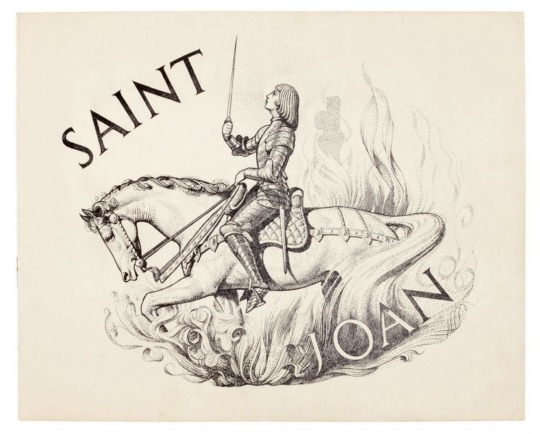
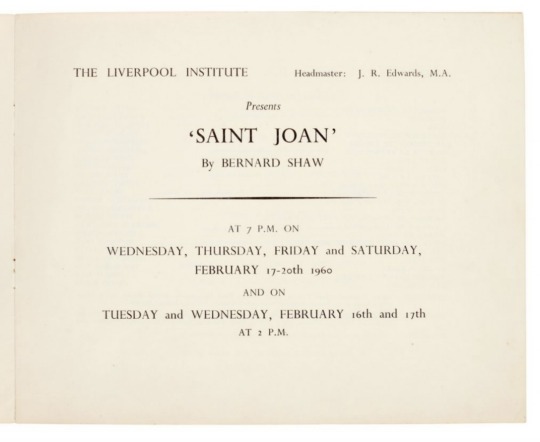
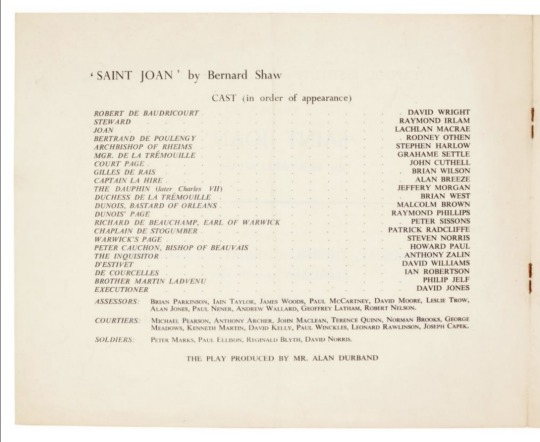
220 notes
·
View notes
Text

Wednesday, April 3rd, 1974
Imagine John and Paul turning up together somewhere in '74 and you turning them away.
#this would be the day after paul and linda were at the oscars#about a week after the 'toot and a snore' jam session#maybe they'd have gotten in if paul had shaved the soul patch
139 notes
·
View notes
Text
4/2/2024
The fag of the day is Paul McCartney!!

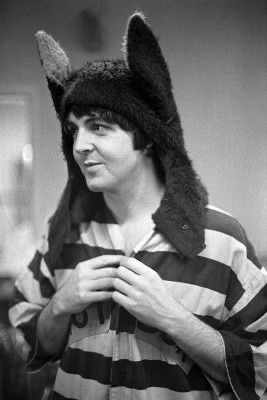
#I enjoy the catboy jokes#but I feel like there's a good chance those are supposed to be donkey ears#for someone playing bottom from a midsummer night's dream#and there's surely a whole other realm of jokes in that
272 notes
·
View notes